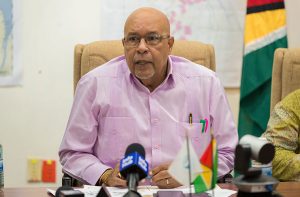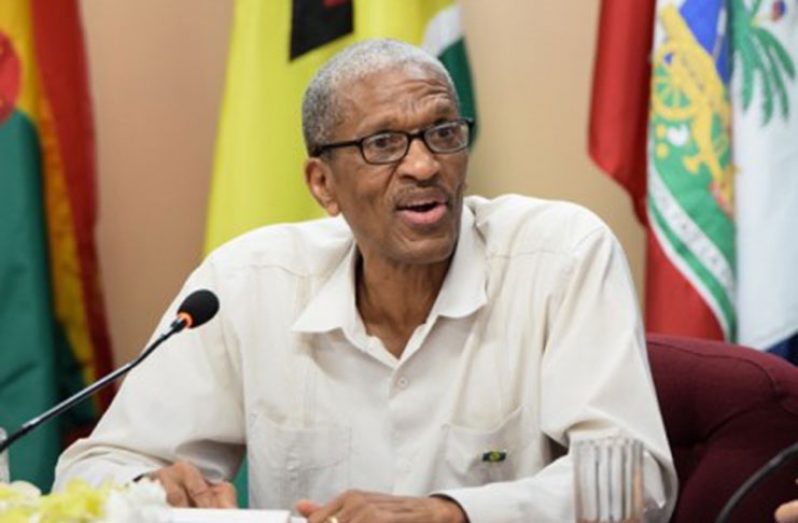– experts say in support of CARICOM vision
HEADS of agencies and businesses in Caribbean are in support of CARICOM’s vision for a “single domestic space” to escape the negative effects of COVID-19 and have put forward their own recommendations for collaboration.
On Saturday, the Guyanese American Chamber of Commerce (GACC) hosted a virtual town hall where it invited the likes of Guyana Water Inc. (GWI) Managing Director, Dr. Richard Van-West Charles; Executive Chairman of the West Indies Rum and Spirits Producers Association (WIRSPA) and Demerara Distillers Limited, Komal Samaroo and Assistant Secretary-General of CARICOM, Dr. Douglas Slater to discuss the topic.
Moderator, Wesley Kirton, had put forward the focal point, stating: “This crisis cannot be left to just the individual member states, but there must be some level of collective and collaborative action on the part of the Region, as a single domestic space.”
UNDERSTANDING DISTRIBUTION
Putting forward his take, Dr. Van-West Charles said that, for the Region to open up a single domestic space and for this to be sustainable, there must first be a common understanding held by the private and public sector of all countries individually.
Within each country, these sectors ought to both comprehend and commit to working towards common strategies to mitigate the virus and its effects.
On the collective regional level, Dr. Van-West Charles said that the regional health system must also be equipped to control transmission of the virus, which means the ability to detect, test, isolate and treat the virus or its symptoms.

“If we attempt to reopen without an understanding of the distribution of the virus in our societies, we’ll make a serious mistake,” he advised.
“If the space were to open up then you must have the capacity to detect and test and the test results be able to return within 24 hours or less, because this would impact us economically and create problems for the system.”
He does not believe that the Region has yet optimally utilised all of its resources with respect to testing and understanding the distribution of the virus.
The former PAHO/WHO representative also noted that mainland countries, like Guyana, will have to take, very seriously, the monitoring of their borders while islands must monitor their ports, both to guard against unauthorized entry.
A REGIONAL SUPPLY CHAIN
Assessing the possibilities for regional collaboration with regards to food security was Executive Chairman of the West Indies Rum and Spirits Producers Association (WIRSPA) and Demerara Distillers Limited, Komal Samaroo.
He said that he believes that there is a lot of work to be done in the Region with regards to the creation of a regional food supply chain that is more internally integrated.
He observed that while the sugar sector has contracted, other agriculture sectors in the Region have not grown which represents a dilemma.
“The Caribbean now is a major importer of the food that it consumes and one of the big challenges before us is how do we reduce the food import bill which our fragile economies cannot afford,” he said.
“When our foreign exchange earnings like tourism and other exports decline, how are we going to afford to import food and to maintain the food import bill that we’re importing at the moment?”
While this is a major challenge, he said that it does present an opportunity for the Region, to come together, for the creation of a regional agriculture industry which sees a supply chain that runs within the Region.
And, learning from such a collective approach, he said that the Region can work to better advertise its own food brands, to the point where its goods are in high demand throughout the world.
Some of the measures the recommended were differentiating labelling for agriculture grown in the Region; developing the Caribbean as a location of good-quality, organic food, not genetically modified and greater ease for the development and expansion of entrepreneurial business.
“I believe that the time has come now for us to really get down — governments and private sector — and come up with time-bound plans that one can work with, so as to reduce, immediately, the food import bill which I believe our shattered economics will find very difficult in the coming months,” he said.
Meanwhile, Retired General Manager of the Jamaica Pegasus Hotel, Eldon Bremner, said that the survival of the Caribbean region will be two-fold —– surviving the pandemic and returning to normalcy.
He said that the tourism sector, which the Caribbean depends highly on, has been one of the hardest-hit sectors and various governments are now struggling to find means to survive the impact.
A COLLECTIVE APPROACH
In presenting CARICOM’s approach, Assistant Secretary-General of CARICOM, Dr. Douglas Slater, first agreed with Van-West Charles that the need for more testing is a major challenge for the Region, even as there is a global shortage of same.
At the Ninth Special Emergency Meeting of the Conference of Heads of Government of CARICOM via video conference, on April 15, one of the strategic decisions made was that more efficient means must be found for procurement.
Dr. Slater said that CARICOM is working closely with the PAHO/WHO Procurement Service which has a wider reach. He said that the body is also seeking to develop a Public Health Policy which will guide the Region upon re-opening. The Council on Human and Social Development (COHSOD) and the Caribbean Public Health Agency (CARPHA) will be working closely to achieve this.
“If we are to open up our ports — airports, seaports — we will need to be guided by science,” the Assistant Secretary-General said.
This likely re-opening up of travel in the Region will also encompass food security as he noted that CARICOM is examining how the Region can become more self-sufficient. The Caribbean Agricultural Research and Development Institute (CARDI) has already submitted a proposal on same.
Meanwhile, with regards to tourism, Dr. Slater said that the Ninth Special Emergency Meeting examined the possibility of CARICOM region, when re-opened, to use the opportunity to encourage intra-regional tourism, as early as summer.
“If we can achieve that, we can encourage our citizens, who will otherwise be travelling out of the Region, to travel within the Region to generate that level of economic activity that will help to address the hotel industry and the tourism industry,” he said.
Altogether, the said that the idea of the Region as a single domestic space, runs parallel to that of the CARICOM Single Market and Economy (CSME) regime, but the current crisis will require a common border policy to determine movement.
He said that the hope for the Region is to remain proactive so that it can come out of one of the world’s worst pandemics, even stronger, collectively, than before.



.jpg)









